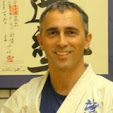
Kyoshi T. Pastrick

Seido and The Shadow
Not long ago in Rome during a Master’s Tennis Tournament something remarkable happened. In a tightly contested game, American Andy Roddick challenged a linesman’s call on a ball hit by his opponent. The remarkable thing about this incident was that Roddick argued against his own interest. He insisted that the opponent’s ball had landed inside the line and that he, Roddick, should NOT be awarded the point. Spectators applauded as if they’d witnessed a miracle. Imagine! Sportsmanship in a professional sporting event.
Such adherence to the principle of “fair play” is especially remarkable in this day and age, when the broad culture places a higher value on winning at any cost than it does on playing by the rules and planning for the long term. According to geneticists and anthropologists, however, it was always this way, and will always be thus. In Dark Nature, naturalist Lyall Watson states that the study of DNA and the genes it codes for shows that there are 3 rules that all living things abide by. Rule 1 is, be nice to insiders. Rule 2 is, be nasty to outsiders. Rule 3 is, cheat a lot. By adhering to these 3 “commandments”, the genes of an organism have a greater chance of making it into the next generation. That trip alone is the objective of every living thing. The articulation of these 3 rules makes a powerful case for doing whatever it takes to succeed.
The problem with living by those 3 rules, though, is that such a life is completely directed by unconscious programs and allows no room for choice. In such a world, Andy Roddick could never have the ability to question the “rightness” of the linesman’s call. He would have no choice but to follow the dictate of Rule 3: cheat a lot. The fact that he chose to override Rule 3 and advocate for a new order suggests that another world is possible beyond that of mere survival.
Throughout history, humans have perceived the possibility of something beyond “the selfish gene“, as Richard Dawkins called it, and have struggled to bring that vision into existence. We have fought for new “games” or societies, with new rules. In these societies insiders are scrutinized and outsiders are made to feel welcome. Cheaters are shunned. Because of the power of our genetic programming however, the creators of these new rules are usually reviled in their own lifetime as traitors to the status quo and the old ways continue undeterred.
We cannot deny our selfish “nature.” But neither do we have to embrace it unquestioningly. Wisdom traditions around the world acknowledge the interplay between the fight for survival and the fight for choice. The Chinese culture even created a logo, if you will, for this interplay between the old and the new. The yin/yang symbol illustrates the sage acceptance of two powerful forces interacting with each other, the shadow and the light. Carl Jung, the Swiss psychiatrist, asked, “How can I be substantial if I fail to cast a shadow?” Both facets of existence, light and shadow, are necessary to maintain balance and order at the new, conscious level of life. Acknowledging the shadow can prevent it from taking over while we are busy pursuing the light. As the old adage says, “The road to hell is paved with good intentions.“
As I’ve written in previous articles, the budo tradition in Japan came into full flower with the emergence of the “sword that heals” as a counterweight to the “sword that kills.” By envisioning a new order that acknowledged both tendencies, the budoka entered into greater harmony with life. An admitted assassin in his youth, Musashi matured in his later years and adopted this new approach, one that did not require murder for success. His substance was only enhanced by his awareness of the shadow.
Kaicho has spoken and written often about the values of the karateka. By emphasizing these values, there is a tacit admission of the power of the shadow, the blind rush to prevail over others at any cost. As karateka, we take upon ourselves the difficult task of balancing the two forces within ourselves. For instance, we practice skills that are meant for conflict, yet we subscribe to the ideals of peace and harmony.
The genetic program to be nice to insiders, nasty to outsiders and to cheat a lot is powerful. The quest for a life of conscious choice is just as powerful. Achieving a greater harmony that encompasses these two forces is never easy. It never will be. Gambatte kudasai! See you in the dojo. Osu!
